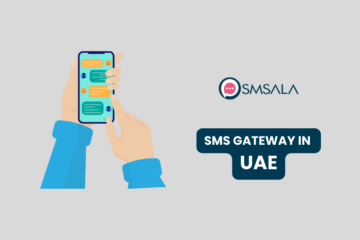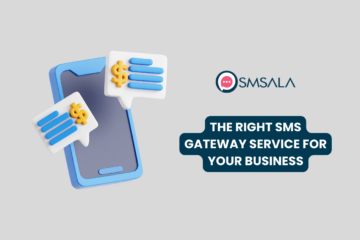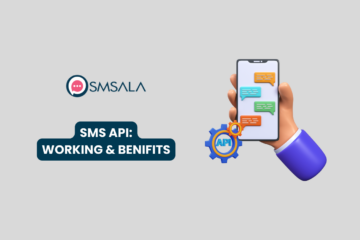In today’s fast-paced digital landscape, businesses constantly search for reliable, efficient communication methods to stay connected with customers. With nearly everyone carrying a mobile phone, SMS (Short Message Service) has become one of the most effective ways to engage with customers in real time. This article will dive deep into the inner workings of SMS gateways, explaining how they can streamline your business communication processes, increase customer engagement, and ultimately, drive business growth.

If you’re wondering how SMS gateways work and why your business needs one, you’re in the right place. By the end of this article, you’ll understand the critical role SMS gateways play in modern business communication and how they can benefit your operations.
What is an SMS Gateway and Why It’s Essential for Modern Businesses
An SMS gateway is a service that allows computers, CRM systems, or applications to send and receive SMS messages to and from mobile phones via telecommunications networks. In simpler terms, it serves as the bridge between your business systems and your customers’ mobile devices.
In today’s competitive market, businesses need to communicate quickly and efficiently with their customers. SMS gateways enable this by providing a direct, instant, and reliable method of communication. Whether you’re sending promotional messages, transactional notifications, or important updates, SMS gateways ensure your messages are delivered seamlessly and without delay.
As more businesses turn to digital channels for customer engagement, SMS has proven to be a powerful tool. With an open rate of 98%, SMS outperforms email, social media, and even app notifications, making it an essential part of any business communication strategy.
Understanding SMS Gateways: The Basics
To fully appreciate how SMS gateways work, it’s essential to grasp the basics. At its core, an SMS gateway enables the delivery of messages between a sender (your business) and the recipient (your customer). But how does this process unfold?
When you send a message through an SMS gateway, the gateway takes your text and forwards it to the recipient via a mobile network. The gateway connects to multiple mobile carriers, allowing it to route the message through the most efficient network. This ensures that your message reaches its destination in a matter of seconds.
In addition to handling SMS traffic, many gateways also support other messaging protocols, such as MMS (Multimedia Messaging Service), enabling businesses to send images, videos, and other rich media.
How SMS Gateways Work: A Step-by-Step Guide
Let’s break down how SMS gateways work:
1. Message Creation
First, a message is created by the sender—this could be a manual input from a computer system, a CRM automation, or an application triggering the SMS to be sent. The content could vary from transactional alerts, promotional offers, to reminders.
2. Transmission to the SMS Gateway
Once the message is created, it is sent to the SMS gateway via a secure protocol, typically HTTP, SMPP (Short Message Peer-to-Peer Protocol), or API integration. These protocols allow your business system to communicate with the gateway and send bulk messages in real time.
3. Routing Through the Network
After receiving the message, the SMS gateway identifies the recipient’s mobile carrier and routes the message through the appropriate network. Thanks to the gateway’s ability to connect with multiple carriers, messages can be delivered globally, even if your customers are located in different countries.
4. Delivery to the Recipient
Finally, the message is delivered to the recipient’s mobile device, typically within seconds. The gateway ensures that all messages comply with the mobile network’s regulations, avoiding any issues with delivery.
By automating this entire process, SMS gateways allow businesses to send thousands (or even millions) of messages at once, making it an ideal solution for marketing campaigns, transaction alerts, or any time-sensitive communication.
Types of SMS Gateways: Which One is Right for Your Business?
There are different types of SMS gateways, and choosing the right one depends on your business size, messaging volume, and technical needs. Here’s an overview of the most common types:
1. Cloud-Based SMS Gateways
A cloud-based SMS gateway is a fully hosted solution that allows businesses to send and receive SMS messages without any on-premise infrastructure. These gateways are highly scalable, making them ideal for small to medium-sized businesses that need to send bulk sms campaigns or automate customer communication.
Advantages:
- Quick setup with no hardware required.
- Easy scalability to meet growing message volume.
- Typically, a pay-as-you-go pricing model.
Disadvantages:
- Less control over the infrastructure.
- Dependent on the third-party provider’s uptime.
2. On-Premise SMS Gateways
On-premise SMS gateways require businesses to set up their own SMS server infrastructure. These are more suitable for larger enterprises that require total control over their messaging operations.
Advantages:
- Full control over messaging operations.
- No reliance on third-party service providers.
Disadvantages:
- Higher setup and maintenance costs.
- Requires technical expertise to manage.
Both types of SMS gateways have their merits, and the best choice depends on your specific business needs. For businesses that need flexibility, cloud-based sms gateways are often the preferred option, while large enterprises with specialized needs may benefit from on-premise solutions.
Benefits of Using an SMS Gateway for Business Communication
SMS gateways offer multiple advantages that make them indispensable for modern businesses. Here are some of the key benefits:
1. Instant Communication
SMS gateways deliver messages instantly, making them perfect for time-sensitive communications. Whether it’s sending an order confirmation, delivery update, or urgent alert, SMS ensures that your message is seen almost immediately.
With the addition of text to video AI, businesses can take their instant communications further by transforming important updates into engaging video content, capturing attention more effectively.
2. Scalability
Whether you’re sending a handful of messages or millions, SMS gateways are built to scale. They allow businesses to easily increase their messaging volume as demand grows, without any additional infrastructure.
3. Cost-Effectiveness
SMS gateways are an affordable communication method, particularly for businesses that send large volumes of messages. Many providers offer bulk pricing, making it an economical option for both marketing and transactional messages.
4. Automation
Many SMS gateways integrate seamlessly with customer relationship management (CRM) systems, allowing businesses to automate their messaging. This means you can set up automated workflows for appointment reminders, order confirmations, and promotional offers without any manual intervention.
5. Global Reach
An SMS gateway allows you to reach customers anywhere in the world. With support for multiple networks and carriers, businesses can communicate with customers across borders, ensuring a global presence.
These benefits make SMS gateways a powerful tool for businesses looking to improve customer engagement, streamline communication, and drive conversions.
Common Use Cases for SMS Gateways in Business
SMS gateways can be used in a variety of ways, depending on your business needs. Here are some of the most common use cases:
1. Transactional Messaging
SMS gateways are ideal for sending automated transactional messages such as order confirmations, delivery updates, or one-time passwords (OTPs) for secure logins. These messages provide valuable information to customers and can significantly enhance the customer experience.
2. Promotional Campaigns
Marketing teams can use SMS gateways to run promotional campaigns that reach thousands of customers instantly. With the ability to send bulk messages, businesses can promote flash sales, new product launches, or exclusive discounts to drive traffic and sales.
3. Customer Support
SMS can also be used for customer support purposes, such as sending appointment reminders, satisfaction surveys, or troubleshooting messages. The instant nature of SMS makes it an excellent tool for real-time customer service.
4. Internal Communications
Large organizations often use SMS gateways for internal communications, such as sending company-wide announcements, emergency alerts, or meeting reminders. This ensures that important messages reach all employees, even those without email access.
Each of these use cases demonstrates the versatility and effectiveness of SMS gateways in driving communication and engagement across different sectors and departments.
How to Integrate an SMS Gateway with Your Business Systems
Integrating an SMS gateway with your existing business systems is key to maximizing its value. Here’s how you can do it:
1. API Integration
Most SMS gateways offer API (Application Programming Interface) integration, allowing you to connect your CRM, eCommerce platform, or website with the gateway. This enables automated messaging, seamless data flow, and easy tracking of customer interactions.
2. CRM Integration
If you’re using a CRM platform like Salesforce or HubSpot, integrating an SMS gateway allows you to automate messages based on customer actions. For example, you can send automated messages when a customer makes a purchase, requests support, or completes a survey.
3. eCommerce Integration
SMS gateways can also be integrated with popular eCommerce platforms like Shopify or WooCommerce. This integration lets you send order confirmations, shipping updates, and abandoned cart reminders directly to customers’ mobile phones.
Choosing an SMS gateway that offers flexible integration options is crucial for ensuring a smooth workflow and enhancing your existing business processes.
Key Features to Look for in an SMS Gateway Provider
When selecting an SMS gateway provider, it’s essential to evaluate the following features to ensure you’re getting the best service:
1. Reliability and Uptime
Look for a provider that guarantees a high uptime rate (99.9% or higher). This ensures that your messages are delivered without delays, even during peak periods.
2. Scalability
As your business grows, your SMS gateway should be able to handle increasing message volumes. Choose a provider that offers scalable solutions and flexible pricing models to accommodate your growth.
3. Security
With data privacy regulations like GDPR and HIPAA, it’s critical to select a provider that offers end-to-end encryption and complies with these standards to protect sensitive customer information.
4. Reporting and Analytics
Access to detailed reporting and analytics is key to tracking the success of your SMS campaigns. Look for a provider that offers insights into delivery rates, open rates, and customer responses.
5. Customer Support
Having access to 24/7 customer support ensures that any issues are quickly resolved. Choose a provider that offers comprehensive technical support to avoid any disruptions to your messaging campaigns.
By evaluating these key features, you can choose an SMS gateway provider that aligns with your business needs and goals.
FAQs About SMS Gateways
To address common concerns, here are some frequently asked questions about SMS gateways:
What is the cost of using an SMS gateway?
The cost depends on the provider, the number of messages you send, and whether you opt for a pay-as-you-go or monthly subscription model.
How do I set up an SMS gateway for my business?
Most providers offer API integration, making it easy to connect the gateway to your existing systems. Some also offer web-based platforms for sending messages without needing integration.
Can I send international messages with an SMS gateway?
Yes, many SMS gateways offer global reach, allowing you to send messages to customers in different countries.
What industries benefit most from using an SMS gateway?
Industries such as eCommerce, retail, healthcare, finance, and hospitality benefit significantly from SMS gateways for customer communication and transactional messaging.
Conclusion: Why Your Business Needs an SMS Gateway Now
In today’s competitive market, effective communication can make all the difference between winning and losing customers. SMS gateways offer businesses a fast, reliable, and cost-effective solution for engaging with customers, streamlining processes, and driving conversions.
Whether you’re sending promotional messages, transactional updates, or customer service notifications, an SMS gateway is a must-have tool that ensures your messages are delivered directly to your audience’s phones. As you evaluate your communication strategy, consider integrating an SMS gateway to enhance your business operations.
Ready to take your customer communication to the next level? Explore our SMS gateway solutions today and see how easy it is to connect with your customers!



